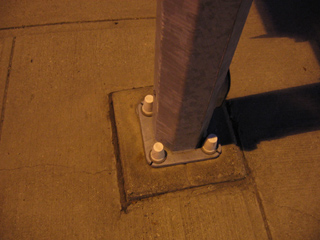Tonight was the first time this year I’ve walked home at night in short sleeves and felt entirely comfortable doing so. Naturally, it reminded me of all the best times when I’ve been able to wander around in cities on bright, cool nights just after the sun has set: after Judo lessons back in North Vancouver, with Alison and Viktoria in Toronto last summer, and during the summer language bursary program in Montreal. In all those and other cases, I remember the incredible sense of ease that accompanies being free and comfortable in uncrowded streets.
The psychological effect of the pleasing climate is enormous, because it changes the way you feel about being in territory that isn’t under your control. During the icy morning in Chichester, frigid walks in Helsinki, or confused meanderings in London during the winter, I was always plotting where I would get some food, where I could get warm, where I could sleep. This leads to calculations of how long you can linger in a Starbucks with or without buying a drink, what time warm open spaces like malls and bookshops close, and how far you have wandered from the nearest place that you have a key or friend that can yet you into.
Wandering on a warm night, by contrast, projects at least the fiction that all the world is reasonably hospitable: that you can wander almost anywhere with few worries and comfort and adventure are simultaneously possible.


Not to put too much of a damper on an upbeat entry, but the fact that your biggest difficulty when it comes to walking around at night is the temperature says a lot about your status as an able-bodied man in a wealthy society.
That’s true enough, though I don’t think I need to feel guilty for appreciating such freedom. It’s a great tragedy that many people – especially women – are in material danger when walking alone at night. That said, I think the level of fear people have is not commensurate to the dangers involved. Just as people in western societies grossly underestimate the mortal risks of driving, I think they over-estimate the dangers posed by violent crime.
Also, I don’t know if wealthy societies are automatically safer to walk around in at night than poorer ones. I would guess that the overall size of the community, for instance, is a more important factor for predicting the incidence of violent crime than mean income.
Good point…for example Rwanda used to be extremely low on violent crime because of a societal habit that if you heard someone in distress, everyone puts out the alarm and everyone comes running. I mean everyone.
On the opposite side, I met a young man once from an African country (I forget which). He said “I like living in Van because I walk around and I’m never scared”. I looked at this six-foot-tall, heavily built black guy that only a total retard would ever pick a fight with, and said “why??” But he was really, really scared of the crime rate in his home town (I’m thinking maybe it was Nairobi?)
Nepal too, is very safe for female travellers, even ones camping out on their own. I wonder how that will change during and after the course of the war?
i never feel unsafe in oxford. i’ve happily walked around at night (although i do feel better in the summer on a light evening)
in nottingham i feel stuck in my house, the media and public opinion makes me feel constantly on-edge. experiences of my friends and neighbours means i feel unprotected even in a crowd. i could never live here for an extended period.
and, as you say, it’s probably just this society over-estimating the dangers posed by violent crime, and i’m sure if i had grown up here i’d shake the feeling off, but once its there you can’t seem to get rid of it.